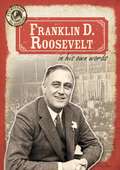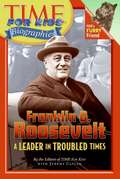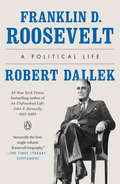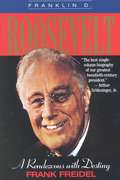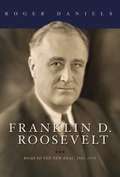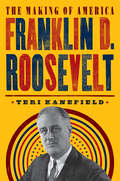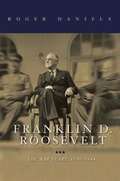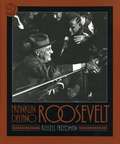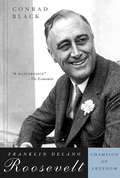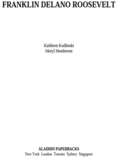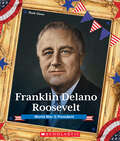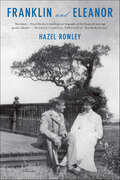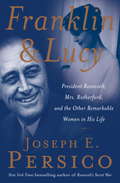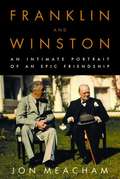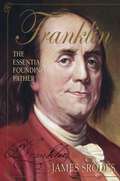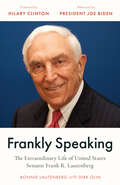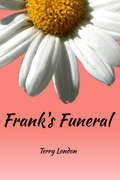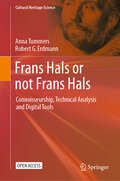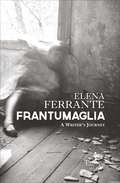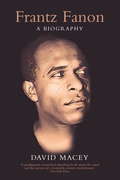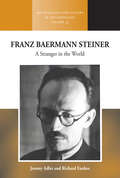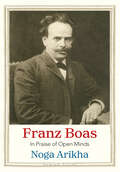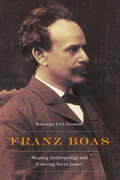- Table View
- List View
Franklin D. Roosevelt in His Own Words
by John SheaFranklin D. Roosevelt was one of the most powerful and popular US presidents. He was the only one to serve 12 years and was elected four times. As the leader of the nation, he saw the country through an economic depression and World War II. Through primary sources, personal and political writings, and quotations, readers will become familiar with the man behind the famous name, from his early life to his momentous presidency. This book is a unique way to examine US history in the early twentieth century through the biography of one remarkable man.
Franklin D. Roosevelt: A Leader in Troubled Times
by Jeremy CaplanThis Time for Kids book vividly portrays the life of Franklin D. Roosevelt focusing on how he rescued the nation out of troubled waters.
Franklin D. Roosevelt: A Political Life
by Robert Dallek“In a period defined by division, gridlock and tweet storms, Dallek crafts a pointillist portrait of the four-term president” —Peter M. Gianotti, Newsday“Will rank among the standard biographies of its subject” —Publishers WeeklyA one-volume biography of Roosevelt by the #1 New York Times bestselling biographer of JFK, focusing on his career as an incomparable politician, uniter, and deal maker In an era of such great national divisiveness, there could be no more timely biography of one of our greatest presidents than one that focuses on his unparalleled political ability as a uniter and consensus maker. Robert Dallek’s Franklin D. Roosevelt: A Political Life takes a fresh look at the many compelling questions that have attracted all his biographers: how did a man who came from so privileged a background become the greatest presidential champion of the country’s needy? How did someone who never won recognition for his intellect foster revolutionary changes in the country’s economic and social institutions? How did Roosevelt work such a profound change in the country’s foreign relations? For FDR, politics was a far more interesting and fulfilling pursuit than the management of family fortunes or the indulgence of personal pleasure, and by the time he became president, he had commanded the love and affection of millions of people. While all Roosevelt’s biographers agree that the onset of polio at the age of thirty-nine endowed him with a much greater sense of humanity, Dallek sees the affliction as an insufficient explanation for his transformation into a masterful politician who would win an unprecedented four presidential terms, initiate landmark reforms that changed the American industrial system, and transform an isolationist country into an international superpower. Dallek attributes FDR’s success to two remarkable political insights. First, unlike any other president, he understood that effectiveness in the American political system depended on building a national consensus and commanding stable long-term popular support. Second, he made the presidency the central, most influential institution in modern America’s political system. In addressing the country’s international and domestic problems, Roosevelt recognized the vital importance of remaining closely attentive to the full range of public sentiment around policy-making decisions—perhaps FDR’s most enduring lesson in effective leadership.
Franklin D. Roosevelt: A Rendezvous with Destiny (Signature Ser.)
by Frank FreidelFreidel (history emeritus, Harvard U., U. of Washington), whose four- volume biography of the young FDR concluded with the launching of the New Deal, now offers a one-volume complete biography. Although he details Roosevelt's life before his presidency, the focus is on the Depression and wartime periods. This will probably become the standard one-volume biography. Annotation(c) 2003 Book News, Inc., Portland, OR (booknews.com)
Franklin D. Roosevelt: Road to the New Deal, 1882-1939
by Roger DanielsFranklin D. Roosevelt, consensus choice as one of three great presidents, led the American people through the two major crises of modern times. The first volume of an epic two-part biography, Franklin D. Roosevelt: Road to the New Deal, 1882-1939 presents FDR from a privileged Hyde Park childhood through his leadership in the Great Depression to the ominous buildup to global war. Roger Daniels revisits the sources and closely examines Roosevelt's own words and deeds to create a twenty-first century analysis of how Roosevelt forged the modern presidency. Daniels's close analysis yields new insights into the expansion of Roosevelt's economic views; FDR's steady mastery of the complexities of federal administrative practices and possibilities; the ways the press and presidential handlers treated questions surrounding his health; and his genius for channeling the lessons learned from an unprecedented collection of scholars and experts into bold political action. Revelatory and nuanced, Franklin D. Roosevelt: Road to the New Deal, 1882-1939 reappraises the rise of a political titan and his impact on the country he remade.
Franklin D. Roosevelt: The Making Of America #5 (The Making of America)
by Teri KanefieldThis biography for young readers explores the life of the thirty-second president, who lifted the United States from depression to global leadership.When Franklin D. Roosevelt was first elected president in 1933, America was in the throes of the Great Depression—the worst economic crisis in U.S. history—and the world was experiencing a menacing rise in Nazism and other dangerous extremists. Throughout his four presidential terms, Roosevelt was a steady and inspiring leader. He implemented progressive social reform through his New Deal agenda and helped lift America from economic crisis. He guided America to victory in World War II. Born into wealth and privilege, Roosevelt entered politics at a young age. His career and world views were shaped by his marriage to Eleanor Roosevelt and his long struggle with polio. Franklin Delano Roosevelt, our thirty-second president, forever left his mark on our nation and the world. By the time of his death, America had grown to a global economic and military superpower. His New Deal legislation changed the relationship of American citizens to their government. His policies came close to fully realizing Alexander Hamilton’s vision of a government that touches and improves the lives of all citizens.The book includes selections from Roosevelt’s writings, endnotes, a bibliography, and an index.“Kanefield provides readers with an intimate examination of Franklin Delano Roosevelt. . . . It flows in a friendly and welcoming style that reluctant readers will appreciate. . . . A solid account for both history buffs and report-writers.” —Kirkus Reviews“Neither hagiography nor a hatchet job, this evenhanded overview of FDR walks a middle path perfect for middle grade readers. A commendable addition to school and public library collections.” —School Library Journal
Franklin D. Roosevelt: The War Years, 1939-1945
by Roger DanielsHaving guided the nation through the worst economic crisis in its history, Franklin Delano Roosevelt by 1939 was turning his attention to a world on the brink of war. The second part of Roger Daniels's biography focuses on FDR's growing mastery in foreign affairs. Relying on FDR's own words to the American people and eyewitness accounts of the man and his accomplishments, Daniels reveals a chief executive orchestrating an immense wartime effort. Roosevelt had effective command of military and diplomatic information and unprecedented power over strategic military and diplomatic affairs. He simultaneously created an arsenal of democracy that armed the Allies while inventing the United Nations intended to ensure a lasting postwar peace. FDR achieved these aims while expanding general prosperity, limiting inflation, and continuing liberal reform despite an increasingly conservative and often hostile Congress. Although fate robbed him of the chance to see the victory he had never doubted, events in 1944 assured him that the victory he had done so much to bring about would not be long delayed. A compelling reconsideration of Roosevelt the president and campaigner, The War Years, 1939-1945 provides new views and vivid insights about a towering figure--and six years that changed the world.
Franklin D. Roosevelt: Thirty-second President Of The United States
by Miriam GreenblattFollows the life of the thirty-second president from birth to death, examining his childhood, education, employment, and political career.
Franklin Delano Roosevelt
by Russell Freedman"As in Lincoln: A Photobiography (Clarion, 1987), Freedman has taken a larger-than-life historical figure about whom innumerable volumes have been written and has retold the story of one man's life in the context of his times. The carefully researched, highly readable text and extremely effective coordination of black-and-white photographs chronicle Roosevelt's priviledged youth, his early influences, and his maturation. Drawing on first-hand observations of his family, friends, and enemies, as well as Roosevelt's own diary entries, Freedman formulates a composite picture of a complex, enigmatic individual and a consummate politician. Roosevelt's public career is given further significance because of the cataclysmic events of the Depression and the tumultuous war years during his presidency. As controversial as many of his programs and policies were or have come to be, no one could ever call to question his dedication, his initiative, or the energy he brought to the job. His all too human shortcomings are just as clearly delineated. Even students with little or no background in American history will find this an intriguing and inspirational human portrait." <br>-School Library Journal
Franklin Delano Roosevelt for Kids: His Life and Times with 21 Activities
by Richard PanchykFranklin Delano Roosevelt's enduring legacy upon the history, culture, politics, and economics of the United States is introduced to children in this engaging activity book. Kids will learn how FDR, a member of one of the founding families of the New World, led the nation through the darkest days of the Great Depression and World War II as 32nd U.S. President. This book examines the Roosevelt family--including famous cousin Teddy Roosevelt and First Lady Eleanor Roosevelt--as well as FDR's early political career and subsequent 12 years in office during some of the most fascinating and turbulent times in American history. Interspersed throughout are first-hand accounts from the people who knew FDR and remember him well. Children will also learn how his personal struggles with polio and his physical disability strengthened FDR's compassion and resolve. In addition, kids will explore Roosevelt's entire era through such hands-on activities as staging a fireside chat, designing a WPA-style mural, sending a double encoded message, hosting a swing dance party, and participating in a political debate.
Franklin Delano Roosevelt: Champion of Freedom
by Conrad BlackFranklin Delano Roosevelt stands astride American history like a colossus, having pulled the nation out of the Great Depression and led it to victory in the Second World War. Elected to four terms as president, he transformed an inward-looking country into the greatest superpower the world had ever known. Only Abraham Lincoln did more to save America from destruction. But FDR is such a large figure that historians tend to take him as part of the landscape, focusing on smaller aspects of his achievements or carping about where he ought to have done things differently. Few have tried to assess the totality of FDR's life and career. Conrad Black rises to the challenge. In this magisterial biography, Black makes the case that FDR was the most important person of the twentieth century, transforming his nation and the world through his unparalleled skill as a domestic politician, war leader, strategist, and global visionary--all of which he accomplished despite a physical infirmity that could easily have ended his public life at age thirty-nine. Black also takes on the great critics of FDR, especially those who accuse him of betraying the West at Yalta. Black opens a new chapter in our understanding of this great man, whose example is even more inspiring as a new generation embarks on its own rendezvous with destiny.
Franklin Delano Roosevelt: Champion of Freedom (Childhood of Famous Americans Series)
by Kathleen V. KudlinskiThis childhood biography of the 32nd president of the United States explores the events that shaped the tenacious character of a young Franklin Delano Roosevelt.
Franklin Delano Roosevelt: World War II President (Presidential Biographies)
by Dusk GlennMeet Franklin Delano Roosevelt, our 32nd president-who battled a debilitating disease to lead America through some of its darkest days.Roosevelt took office during the Great Depression and with World War II on the horizon. He led the nation through both crises with a combination of strength and caring. He will always be remembered.This series of engaging, in-depth books introduces readers to the men who have led our country since its very first days. Lively text and colorful illustrations are supplemented by fun facts, a timeline, and even a sampling of the subject's most famous quotes.Presidential Biographies will be the first books kids reach for when writing a report-or if they're simply looking for a fascinating read!
Franklin and Eleanor: An Extraordinary Marriage
by Hazel Rowley“Revelatory. . . . [This] crackling new biography of the Roosevelt marriage speaks volumes.” —Maureen Corrigan, NPR’s Fresh Air, Best Books of 2010Franklin Delano and Eleanor Roosevelt’s marriage is one of the most celebrated and scrutinized partnerships in presidential history. It raised eyebrows in their lifetimes and has only become more controversial since their deaths. From FDR’s lifelong romance with Lucy Mercer to Eleanor’s purported lesbianism—and many scandals in between—the American public has never tired of speculating about the ties that bound these two headstrong individuals. Some claim that Eleanor sacrificed her personal happiness to accommodate FDR’s needs; others claim that the marriage was nothing more than a gracious façade for political convenience. No one has told the full story until now.In this groundbreaking new account of the marriage, Hazel Rowley describes the remarkable courage and lack of convention—private and public—that kept FDR and Eleanor together. She reveals a partnership that was both supportive and daring. Franklin, especially, knew what he owed to Eleanor, who was not so much behind the scenes as heavily engaged in them. Their relationship was the product of FDR and Eleanor’s conscious efforts—a partnership that they created according to their own ambitions and needs.In this dramatic and vivid narrative, set against the great upheavals of the Depression and World War II, Rowley paints a portrait of a tender lifelong companionship, born of mutual admiration and compassion. Most of all, she depicts an extraordinary evolution—from conventional Victorian marriage to the bold and radical partnership that has made Franklin and Eleanor Roosevelt go down in history as one of the most inspiring and fascinating couples of all time.
Franklin and Lucy: President Roosevelt, Mrs. Rutherfurd, and the Other Remarkable Women in His Life
by Joseph E. PersicoFranklin Delano Roosevelt was arguably the greatest figure of the twentieth century. While FDR's official circle was predominantly male, it was his relationships with women--particularly with Lucy Mercer Rutherfurd--that most vividly bring to light the human being beneath this towering statesman. It is no coincidence that Rutherfurd was with Roosevelt the day he died in Warm Springs, Georgia, along with two other close women companions. In Franklin and Lucy, acclaimed author and historian Joseph E. Persico explores FDR's romance with Lucy Rutherfurd, which was far deeper and lasted much longer than was previously acknowledged. Persico's provocative conclusions about their relationship are informed by a revealing range of sources, including never-before-published letters and documents from Lucy Rutherfurd's estate that attest to the intensity and scope of the affair.FDR's connection with Lucy also creates an opportunity for Persico to take a more penetrating look at the other women in FDR's life. We come to see more clearly how FDR's infidelity as a husband contributed to Eleanor's eventual transformation from a repressed Victorian to perhaps the greatest American woman of her century; how the shaping hand of FDR's strong-willed mother helped to imbue him with the resolve to overcome personal and public adversity throughout his life; and how other women around FDR, including his "surrogate spouse," Missy LeHand, and his close confidante, the obscure Margaret "Daisy" Suckley, completed the world that he inhabited. Franklin and Lucy is an extraordinary look at the private life of a leader who continues to fascinate scholars and the general public alike. In focusing on Lucy Rutherfurd and the myriad women who mattered to Roosevelt, Persico paints a more intimate portrait than we have heretofore had of this enigmatic giant of American history.
Franklin and Winston: An Intimate Portrait of an Epic Friendship
by Jon MeachamNEW YORK TIMES BESTSELLER • In this &“beautifully written and superbly researched dual biography&” (Los Angeles Times Book Review), Pulitzer Prize–winning biographer Jon Meacham &“paints a powerful portrait of the enormous friendship between World War II allies [Franklin] Roosevelt and [Winston] Churchill&” (Vanity Fair). &“Intense and compelling reading.&”—The Washington PostFranklin Roosevelt and Winston Churchill were the greatest leaders of &“the Greatest Generation.&” In Franklin and Winston, Jon Meacham explores the fascinating relationship between the two men who piloted the free world to victory in World War II. Born in the nineteenth century and molders of the twentieth and twenty-first, Roosevelt and Churchill had much in common. In their own time both men were underestimated, dismissed as arrogant, and faced skeptics in their own nations—yet both magnificently rose to the central challenges of the twentieth century. Theirs was a kind of love story, with an emotional Churchill courting an elusive Roosevelt. The British prime minister, who rallied his nation in its darkest hour, standing alone against Adolf Hitler, was always somewhat insecure about his place in FDR&’s affections—which was the way Roosevelt wanted it. A man of secrets, FDR liked to keep people off balance, including his wife, Eleanor, his White House aides—and Winston Churchill.Meacham&’s sources—including unpublished letters of FDR&’ s great secret love, Lucy Mercer Rutherfurd, the papers of Pamela Churchill Harriman, and interviews with people who were in FDR and Churchill&’s joint company—shed light on the characters of both men as he engagingly chronicles the hours in which they decided the course of the struggle.Charting the personal drama behind the discussions of strategy and statecraft, Meacham has written the definitive account of the most remarkable friendship of the modern age.
Franklin: The Essential Founding Father
by James SrodesIn his lifetime, Benjamin Franklin was celebrated all over the Western world. And with good reason, says award-winning biographer James Srodes in his riveting, comprehensively researched portrait of a man he calls "the essential Founding Father." <P><P>Having plumbed archives and other sources neglected by previous biographers, Srodes debunks numerous myths that have gathered about Franklin--many of them spun by other Founding Fathers. Where John Adams--and his biographer David McCullough--had Franklin as indolent and careless, Srodes uses recently discovered documents to show that Franklin was keeping his colleague at arm's length in order to conduct convert activities to help the American cause. Srodes also looks closely at Franklin's reputation as a philanderer and challenges many long-held assumptions. <P><P>Franklin is a fascinating study of a man of ceaseless energies and remarkable accomplishments: an apprentice printer from Boston who made his name and fortune in colonial Philadelphia before having his greatest adventures in Europe's leading capitals, London and Paris. Here we find the complete Franklin--scientist, diplomat, tradesman, author, inventor, celebrated wit, spymaster, propagandist, military leader, quartermaster. Srodes offers extraordinary insight into this complex man, showing us how Franklin's ability to divide his life into discrete compartments enabled him to accomplish so much in so many different areas. <P><P>Of the many roles Franklin, played, he is perhaps most familiar to us as the genius inventor and experimenter. After all, Franklin's electrical experiments earned him the Copley Medal, the eighteenth-century equivalent of the Nobel Prize, and many of his inventions (including bifocals, the lightning rod, and the Franklin stove) are still with us today. But as Srodes shows, Franklin's greatest invention was America, for "it is hard to see how we would be what we are today without the eighty-four-year progress of Benjamin Franklin." <P><P>More than twenty years before the Declaration of Independence, Franklin was the first to put forward a plan to unite the colonies, and he took the lead in challenging King George's authority. One of only six men to sign both the Declaration and the Constitution, he secured the alliance with France that proved essential to America's success in the Revolution. Indeed, one could say that while George Washington won the battles, Benjamin Franklin won the war.
Frankly Speaking: The Extraordinary Life of United States Senator Frank R. Lautenberg
by Bonnie LautenbergFrank Lautenberg was the embodiment of the American dream. The son of Eastern European immigrants who toiled in the factories of northern New Jersey, he rose to become a Fortune 500 CEO and eventually a five-term US senator. Yet his is not a simple rags-to-riches tale, but is rather the story of someone who used his newfound affluence and influence to improve the lives of ordinary Americans. Told by one of the people who knew him best, his widow Bonnie, Frankly Speaking reveals the political strategies that made Lautenberg one of the Senate’s most powerful advocates for the health and safety of America’s citizens. He championed seemingly minor, unglamorous reforms that made a big difference to everyday lives, from raising the national drinking age to preventing domestic abusers from purchasing guns. These campaigns earned him powerful enemies in the alcohol, tobacco, and firearms industries, and he was subjected to some of the most brutal campaign mudslinging in American history. Yet, as this inspiring biography reveals, New Jersey’s longest-serving senator was not afraid to take big political risks if it meant standing up for his principles, whether that meant opposing the Iraq War or protecting LGBTQ and women’s rights.
Frank’s Funeral
by Terry LondonFrank was an abusive and violent alcoholic. Terry was his eldest daughter. Frank's 'mistress' was a dark and foreboding force throughout Terry's life -- while Frank was alive and well after his death. Terry suffered many beatings as a child and as an adult. Frank was very cruel. He had a warped idea of love. Frank's final wishes in his Last Will and Testament were difficult to comprehend. Sadly, Terry had to fight against members of her own family in the Supreme Court. Terry's raw and incredibly honest story is heartbreaking. Her sense of humour doesn't mask the sadness, but makes some of the words easier to read. This is a true story of strength and courage.
Frans Hals or not Frans Hals: Connoisseurship, Technical Analysis and Digital Tools (Cultural Heritage Science)
by Anna Tummers Robert G. ErdmannFrans Hals is hailed as one of the three greatest painters of the Dutch seventeenth century along with Rembrandt and Vermeer. Of all seventeenth-century Dutch painters, Frans Hals is also the most controversial in as far as the exact scope of his oeuvre is concerned. Hals’s popularity, the lack of technical reference material as well as the differing views among experts as to the exact scope of his oeuvre make works in his style prone to doubts and misattributions. It has led to fierce debates and legal battles about the attribution of paintings done in his style. In this Open Access book, experts from Ghent University, Leiden University, Amsterdam University, Delft University of Technology, the Frans Hals Museum (Haarlem), the Rijksmuseum (Amsterdam), the Gemäldegalerie (Berlin) and the Metropolitan Museum of Art (New York) give surprising new insights into some of Hals’s most well-known paintings as well as into some of the most fiercely contested pictures in his style. Their insights result from in-depth study of a wealth of reference material: seventeenth-century sources, advanced technical analyses and newly developed digital visualisation tools. “Tummers and Erdmann have produced a work of ground-breaking new scholarship. They combine in-depth art historical study with new technical analyses and data visualisation tools in order to solve current issues in the attribution of paintings by Frans Hals. This book significantly sharpens our understanding of Hals’s virtuoso work process, his characteristic workshop practice, and his notion of authenticity. The rich data gathered for the case studies will be useful for a next generation of art historians and connoisseurs: digital tools enhance the human eye in matters of attribution.” Prof. Thijs Weststeijn, Professor of Art History before 1800, Utrecht University "Tummers bravely interrogates the history of connoisseurship and the seemingly never-ending search for attributions of paintings associated with Frans Hals. A series of well-chosen case studies of paintings rigorously subjected to the most current means of examination and scientific imaging by leading experts in the field extends our understanding of Hals, his manner of painting, and the possibilities for aligning traditional connoisseurship with technical studies and techniques. In the process, this book thoughtfully probes the merits, challenges, and potential of 21st-century digital tools alongside the role of visual analysis." Christopher D.M. Atkins, Van Otterloo-Weatherbie Director of the Center for Netherlandish Art at the Museum of Fine Arts, Boston
Frantumaglia: A Writer's Journey
by Elena FerranteOne of The Guardian&’s Best Books of the Year: Personal writings by the anonymous author who became a literary phenomenon with My Brilliant Friend. The writer known as Elena Ferrante has taken pains to hide her identity in the hope that readers would focus on her body of work. But in this volume, she invites us into Elena Ferrante&’s workshop and offers a glimpse into the drawers of her writing desk—those drawers from which emerged her three early standalone novels and the four installments of the Neapolitan Novels, the New York Times–bestselling &“enduring masterpiece&” (The Atlantic). Consisting of over twenty years of letters, essays, reflections, and interviews, it is a unique depiction of an author who embodies a consummate passion for writing. In these pages, Ferrante answers many of her readers&’ questions. She addresses her choice to stand aside and let her books live autonomous lives. She discusses her thoughts and concerns as her novels are being adapted into films. She talks about the challenge of finding concise answers to interview questions. She explains the joys and the struggles of writing, the anguish of composing a story only to discover that that story isn&’t good enough. She contemplates her relationship with psychoanalysis, with the cities she has lived in, with motherhood, with feminism, and with her childhood as a storehouse for memories, impressions, and fantasies. The result is a vibrant and intimate self-portrait of a writer at work. &“Everyone should read anything with Ferrante&’s name on it.&” —The Boston Globe
Frantz Fanon
by David MaceyBorn in Martinique, Frantz Fanon (1925-61) trained as a psychiatrist in Lyon before taking up a post in colonial Algeria. He had already experienced racism as a volunteer in the Free French Army, in which he saw combat at the end of the Second World War. In Algeria, Fanon came into contact with the Front de Libération Nationale, whose ruthless struggle for independence was met with exceptional violence from the French forces. He identified closely with the liberation movement, and his political sympathies eventually forced him out the country, whereupon he became a propagandist and ambassador for the FLN, as well as a seminal anticolonial theorist.David Macey's eloquent life of Fanon provides a comprehensive account of a complex individual's personal, intellectual and political development. It is also a richly detailed depiction of postwar French culture. Fanon is revealed as a flawed and passionate humanist deeply committed to eradicating colonialism.Now updated with new historical material, Frantz Fanon remains the definitive biography of a truly revolutionary thinker.
Franz Baermann Steiner: A Stranger in the World (Methodology & History in Anthropology #42)
by Jeremy Adler Richard FardonFranz Baermann Steiner (1909-52) provided the vital link between the intellectual culture of central Europe and the Oxford Institute of Anthropology in its post-Second World War years. This book demonstrates his quiet influence within anthropology, which has extended from Mary Douglas to David Graeber, and how his remarkable poetry reflected profoundly on the slavery and murder of the Shoah, an event which he escaped from. Steiner’s concerns including inter-disciplinarity, genre, refugees and exile, colonialism and violence, and the sources of European anthropology speak to contemporary concerns more directly now than at any time since his early death.
Franz Boas: In Praise of Open Minds (Jewish Lives)
by Noga ArikhaA thought-provoking account of the life and work of Franz Boas and his influential role in shaping modern anthropology Franz Boas (1858–1942) is widely acknowledged for his pioneering work in the field of cultural anthropology. His rigorous studies of variations across societies were aimed at demonstrating that cultures and peoples were not shaped by biological predispositions. This book traces Boas&’s life and intellectual passions from his roots in Germany and his move to the United States in 1884, partly in response to growing antisemitism in Germany, to his work with First Nations communities and his influential role as a teacher, mentor, and engaged activist who inspired an entire generation. Drawing from Boas&’s numerous but rarely read writings, Noga Arikha brings to life the man and the ideas he developed about the complex interplay of mind and culture, biology and history, language and myth. She provides a comprehensive picture of the cultural contexts in which he worked, of his personal and professional relationships, and of his revolutionary approach to fieldwork. He was celebrated in his lifetime for the cultural relativism he developed and the arguments he marshaled against entrenched racialism. But his was a constant battle, and Arikha shows how urgently relevant his voice and legacy have become again today.
Franz Boas: Shaping Anthropology and Fostering Social Justice (Critical Studies in the History of Anthropology)
by Rosemary Lévy ZumwaltFranz Boas defined the concept of cultural relativism and reoriented the humanities and social sciences away from race science toward an antiracist and anticolonialist understanding of human biology and culture. Franz Boas: Shaping Anthropology and Fostering Social Justice is the second volume in Rosemary Lévy Zumwalt&’s two-part biography of the renowned anthropologist and public intellectual. Zumwalt takes the reader through the most vital period in the development of Americanist anthropology and Boas&’s rise to dominance in the subfields of cultural anthropology, physical anthropology, ethnography, and linguistics. Boas&’s emergence as a prominent public intellectual, particularly his opposition to U.S. entry into World War I, reveals his struggle against the forces of nativism, racial hatred, ethnic chauvinism, scientific racism, and uncritical nationalism. Boas was instrumental in the American cultural renaissance of the 1920s and 1930s, training students and influencing colleagues such as Melville Herskovits, Zora Neale Hurston, Benjamin Botkin, Alan Lomax, Langston Hughes, and others involved in combating racism and the flourishing Harlem Renaissance. He assisted German and European émigré intellectuals fleeing Nazi Germany to relocate in the United States and was instrumental in organizing the denunciation of Nazi racial science and American eugenics. At the end of his career Boas guided a network of former student anthropologists, who spread across the country to university departments, museums, and government agencies, imprinting his social science more broadly in the world of learned knowledge.Franz Boas is a magisterial biography of Franz Boas and his influence in shaping not only anthropology but also the sciences, humanities, social science, visual and performing arts, and America&’s public sphere during a period of great global upheaval and democratic and social struggle.
